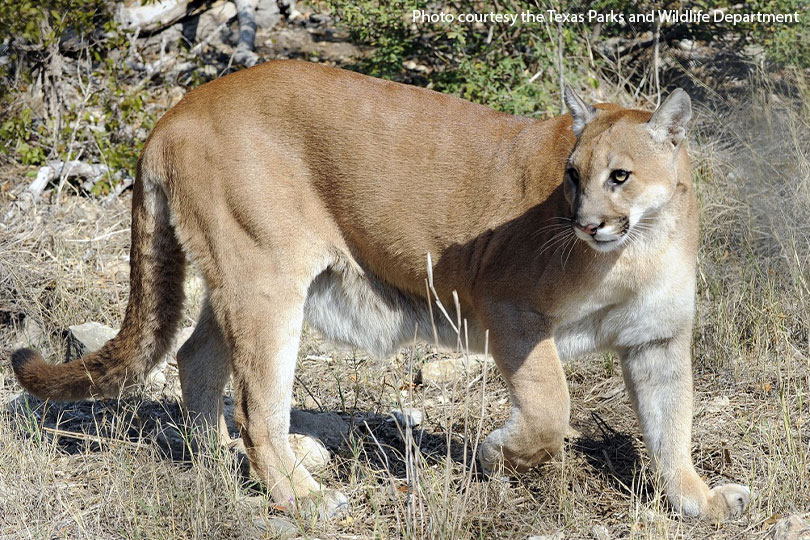By Jessica Domel
Multimedia Reporter
The Texas Parks and Wildlife Department (TPWD) has been asked to create a draft mountain lion management plan, including mandatory trap checks and a potential ban on canned hunts.
The request came from the Texas Parks and Wildlife Commission after the commission heard the final report from the Texas Mountain Lion Stakeholder Working Group.
The group was created in 2022 after Texans for Mountain Lions petitioned the department asking for bag limits, mandatory harvest reporting, required 36-hour trap checks and additional research on the elusive wildcats.
TPWD denied the proposed regulatory actions at the time.
The commission chair directed the formation of the 19-member working group to make recommendations on six topics:
- abundance, status, distribution, and persistence of mountain lions in Texas;
- development of a mountain lion management plan for Texas;
- harvest reporting;
- trap/snare check standards;
- harvest/bag limits; and
- “canned” hunts.
The stakeholder working group included landowners, livestock raisers, private land managers, trappers, houndsmen, wildlife scientists, wildlife biologists and natural resource professionals.
“We’ve had great participation in this process,” Joseph Fitzsimmons, stakeholder working group chairman, told the commission. “It goes without saying there’s some very strong opinions on the management of mountain lions in Texas.”
Mountain lions are classified as a non-game animal in the Lone Star State. Texas Farm Bureau policy supports classifying the mountain lion as a predator rather than a game animal.
There is no season or bag limits.
There are also no trap check requirements, except for commercial trappers. They’re required to check traps every 36 hours.
Canned hunting of mountain lions is legal.
“There have been a number of petitions in addition to the 2022 petitions, and suffice to say, recommendations have been made, some studies have been conducted, but to-date, we do not have a management plan for mountain lions. The reason for that is we don’t have the data,” Fitzsimmons, who has also served as parks and wildlife chairman, said.
The working group could not advise the commission on the abundance, status, distribution and persistence of mountain lions in Texas, which is charge one, because more data is needed.
The group also could not make recommendations on the development of a mountain lion management plan because of the lack of data.
There was general support from the stakeholder working group to develop a plan.
Fitzsimmons told the commission the livestock and hunting communities feel the plan should ensure a landowner’s ability to manage depredation of livestock from mountain lions.
The stakeholder working group was split on the third charge, which is harvest reporting.
“All the experts that briefed us were clear that harvest reporting is critical for building a management plan,” Fitzsimmons said. “You’ve got to know age, sex and, if possible, have some DNA material to really understand a population. We lack that. We don’t have mandatory reporting.”
The real question, Fitzsimmons said, is whether harvest reporting should be mandatory or voluntary.
“The split was pretty clear in the agricultural/livestock and some of the hunting community to stay with voluntary reporting,” Fitzsimmons said. “The scientific community was equally clear that mandatory reporting was much more reliable than voluntary.”
The petitioners were unanimous in their recommendation to follow the standard of mandatory reporting.
“The problem, as you see, is that as pointed out by landowners, there was a risk of alienating private landowners with harvest reporting,” Fitzsimmons said. “Obviously, if you’re not getting the participation of the very people who are managing the lion habitat, you may be undermining those efforts by going to mandatory.”
The working group suggested voluntary reporting—encouraging landowners, hunters and others to voluntary report harvests to TPWD through services like the My Texas Hunt Harvest app.
The group did not have a clear consensus on requiring trap checks, and Fitzsimmons said there were a lot of concerns like lions left to die in traps, bycatch, the negative images of trapping and spillover into other species.
“The people who oppose the trap check said, ‘Well, if you add the lions like you do the fur bearers, where do you stop?’ Fitzsimmons said.
There were also concerned with the additional work required to check traps every 36 hours.
Fitzsimmons said there’s a clear consensus to ban canned hunts of mountain lions.
“That can be done through the prohibition of the holding of a live lion, but for some reasons, mountain lions were exempted from an earlier statute regarding canned hunting in the legislature,” Fitzsimmons said.
After the Texas Mountain Lion Stakeholder Working Group’s presentation, TPWD was asked to come back to the commission with a plan for data collection, additional science and how that could lead into a permanent management plan.

